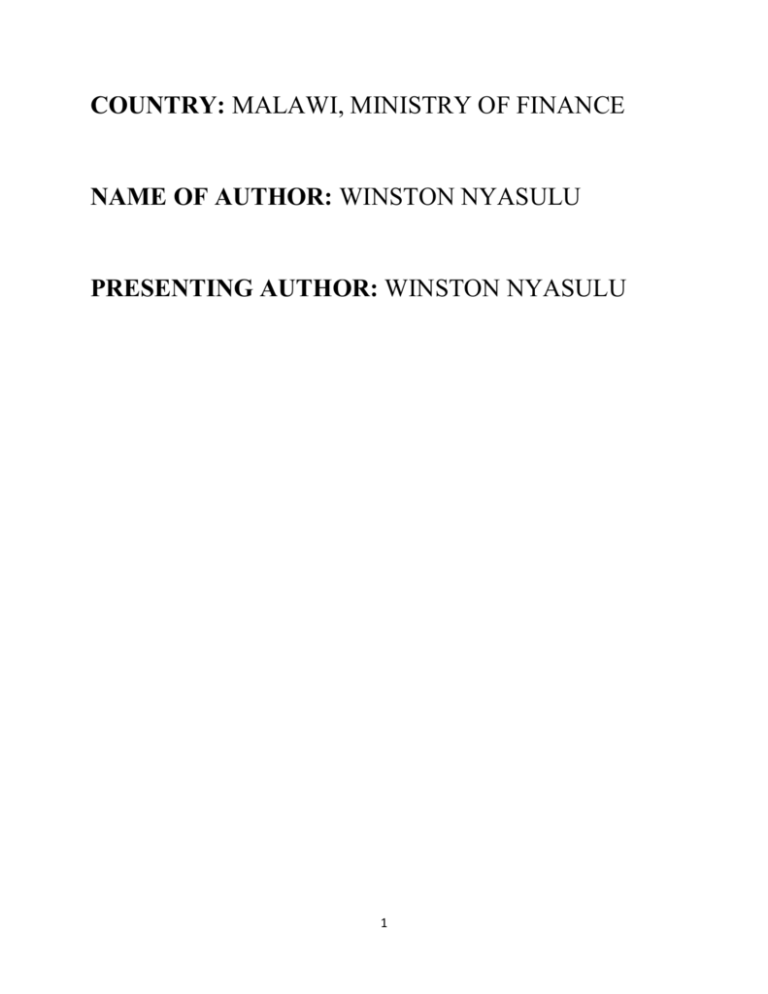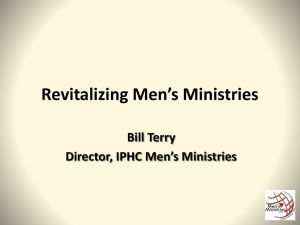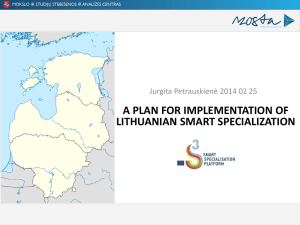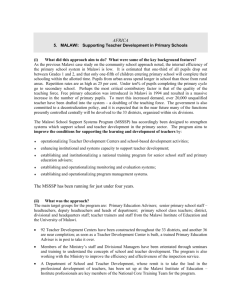Monitoring and Evaluation of The National Budget in Malawi
advertisement

COUNTRY: MALAWI, MINISTRY OF FINANCE NAME OF AUTHOR: WINSTON NYASULU PRESENTING AUTHOR: WINSTON NYASULU 1 MONITORING AND EVALUATION OF THE NATIONAL BUDGET IN MALAWI 1.0 Introduction Budgets are a vital policy tool that governments use to promote their objectives, from ensuring macroeconomic stability to allocating resources and delivering services. Given the inherently technical nature of budget processes, and their core political function of raising and distributing public resources, they have often been scrutinised and deemed to be characterized by a lack of transparency and scarce participation by external actors1. The only way to counter this thinking is through Budget Monitoring and Evaluation which provides documented observation of processes and activities of government programmes over a period. It is a way of ensuring that monies voted for various projects and activities in the budget are actually spent and put into good use. According to the Public Finance Management Act (2003), the Ministry of Finance is mandated to follow up on budget implementation on both the recurrent and development budget. Currently, the Monitoring and Evaluation Section of the Budget Division takes up this responsibility. However, there are other institutions that also do M&E of the Budget. These are Ministry of Economic Planning and Development (MoEPD) and Office of the President and Cabinet (OPC). 2.0 Justification for Monitoring the Government Budget There are a number of reasons why monitoring and evaluation of the Budget is important for the Ministry of Finance and other stakeholders. Some of these are as follows: 1 Ministry of Finance, Budget Manual, Malawi Government, 2009 2 Government budget involves Public Finances and in a democracy, citizens have a right to know what their money is being spent on and how; To determine the level of performance of Government in terms of service delivery promised to the people; To keep Ministries and Government Departments alert, since they know that they are being assessed by others as they perform their activities; To enhance transparency of Government and build public confidence in the budget process; and To assist in decision-making within Government. 3.0 Institutions Responsible for Budget Monitoring and Evaluation 3.1Ministry of Finance (MoF) MoF is responsible for monitoring progress of implementation of the Budget on all categories of the budget; Personal Emoluments (PE), Other Recurrent Transactions (ORT) and Development Budget. Under the PE Budget, the wage bill trends are analysed and where huge variations are found, reviews are made for proper recommendations. The ORT Budget is monitored by comparing planned outputs (as indicated in the Output Based Budget Document) to the actual outputs delivered by Ministries. The Development Budget is monitored by visiting project sites (such as roads, hospitals, etc) and then reports are written based on the progress made in those project sites. The reports are produced on a quarterly basis and submitted to the Secretary to the Treasury as well as Cabinet. 3.2 Ministry of Economic Planning and Development MoEPD is responsible for evaluation of projects and programs as implemented in the National Budget. The basis for evaluation of projects is that the Public Sector Investment Programme (PSIP) which is a basket of projects implemented by Government is under the mandate of this Department2. In addition, the Ministry leads the process of coming up with national policy documents such as the Malawi Growth and Development Strategy (MGDS). The MGDS is the overarching medium term strategy for Malawi designed to attain long term development 2 Ministry of Economic Planning and Development, Public Sector Investment Programme (PSIP) and Development Budget Comparison, Malawi Government, 2009 3 aspirations3. The National budget is formulated based on the priorities as set out in the MGDS. This is why the Ministry carries out evaluations to assess impact of projects and programs on livelihood. 3.3 Office of the President and Cabinet OPC has a Programs and Project Evaluation Unit which monitors budget implementation by evaluating organisational performance agreements (OPAs). The OPAs are signed agreements between Controlling Officers of Ministries and the Chief Secretary in the OPC. In the OPAs, ministries commit to achieve specific outputs in a particular financial year depending on the levels of resources provided. The assessment tries to ascertain if the agreed outputs have been achieved. 4.0 Challenges in Monitoring and Evaluation of the Budget M&E faces a number of challenges. Below are some of the challenges: 4.1Duplication of Reports Ministries submit monitoring reports to a number of institutions (OPC, MoF, MoEPD), which creates duplication and heavy paper work to the Ministries. 4.2 Inadequate Capacity to Monitor the Whole Budget The M&E Section in the Budget Division does not have the required capacity to monitor the entire budget. This is because the Section does not have enough Officers to prepare and monitor the budget at the same time. 4.3 Resistance of Ministries to be Monitored and Evaluated When M&E is seen as Auditing, Ministries and Departments are reluctant to participate in the M&E activities. Therefore, there is reluctance to submit budget progress reports which make it difficult for the M&E Section to follow up on outputs being delivered by Ministries. 4.4 Lack of M&E Database System There is lack of an M&E System that can coordinate information for all the M&E Departments in the Government System. Reports from Ministries are usually hard copies which can be misplaced easily. 3 Ministry of Economic Planning and Development, Malawi Growth and Development Strategy, Malawi Government, 2011 4 4.5 Absence of M&E Unit in some Ministries/Departments Not every Ministry/Department in the Government system has an M&E Unit in place. This makes it difficult to collect information on these Departments. 4.6 Lack of Information Sharing Sharing of information between various stakeholders (OPC, MoF, MoEPD,etc) involved in the M&E of the Budget is a challenge. 4.7 Unclear Output Indicators Since the M&E Section monitors immediate outputs, the Output Based Budget Document is the only reference material; however, its output indicators are not clearly defined making monitoring and evaluation to be difficult and of little value. 4.8 Lack of Feedback M&E data must be fed back into the Ministries to guide in the implementation of on-going activities and the planning of future ones. However, there is little feedback that goes to the implementing agencies. 5.0 Solutions to improve the M&E of the Budget The following solutions have been proposed to counter the challenges highlighted above. 5.1 Enhance Monitoring ORT Expenditure There is need to strengthen monitoring of the ORT Budget which gets more resources than the Development Budget. This can be achieved by encouraging ministries to indicate clear outputs to be achieved under the ORT Budget. This would make it easy to follow up on progress of implementation. 5.2 Harmonization of M&E Templates The various M&E Departments in the Government system should develop a standard template that will gather information necessary for all Departments. The standard monitoring and evaluation templates could be developed together with all the concerned parties. 5 5.3 Creation of an Online M&E Budget Database An Online-web based system should be created where Ministries would input their quarterly budget progress reports both for the recurrent and development budget. The information would be readily available to all stakeholders since the reports would have been standardized. 5.4 Improve Capacity Building There is need to build capacity of the M&E Section through trainings of Officers to equip them with skills to conduct proper monitoring and evaluation of the budget. 5.5 Redefine Outputs and their Indicators To avert the problem of unclear output indicators, it is imperative that the current budget indicators be clearly defined in collaboration with Line Ministries and with reference to the MGDS. Therefore, there is need to conduct training for implementing agencies to improve on development of outputs at budget planning stage. 5.6 Improve on Feedback For the lessons learned, it is quite proper to relay the results to relevant stakeholders to redirect the course of implementation. 5.7 Conduct Public Expenditure Reviews (PERs) PERs are another form of M&E which assist Government to make immediate decisions in view of longer-term trends and helps bring more rationality into the budget monitoring process. Previously, PERs have been influenced by development partners such as the World Bank hence the concentration on sectors where the Bank has more interest. However, M&E Departments should be able to initiate PERs on their own by looking at the whole budget. 6.0 Independence of Budget Monitoring and Evaluation In Malawi, budget evaluation has some level of independence. Politically, the President and Cabinet ministers are keen to learn on the achievements made in the execution of programs in the budget. There is less interference on the M&E activities. However, there is need for the M&E Units in the Departments to be 6 headed by more senior Officers so as to reduce interference. Secondly, there are some Departments such as State Residences, OPC and Malawi Defence Force where less M&E of budget programs is done compared to other Departments. This is mainly due to fear of political pressure on the part of Officers. This phenomenon has gone down since 2012 as OPC is also working on the M&E activities. 6.1 Credibility of Budget Monitoring and Evaluation There is a degree of credibility of M&E in Malawi on the Budget. However, it is being compromised by lack of expertise on evaluation as earlier alluded to. There is need for M&E Officers to acquire specialised skills on evaluations as it would improve on the quality of evaluations. No wonder, there is less evaluation being done on the budget as M&E Officers focus on monitoring. The PERs have contributed on the evaluation of the budget, but since most of them are done by consultants, there is no skills transfer to the Officers to carry out the evaluations of their own. 6.2 Use of Budget Monitoring and Evaluation On use of evaluations by decision makers in Government, it must be admitted that less is being done. Experience has shown that evaluations on the budget are mainly used by Ministry of Finance to assist in resource allocation and disbursement. To improve on the use of evaluations, there is need for proper feedback to the implementing agencies. This could be done by having quarterly or annual budget reviews with the Ministries to discuss the results of evaluations and agree with them on the necessary actions to be taken. 7.0 Conclusion Budget Monitoring and Evaluation in Malawi is vital for purposes of accountability and transparency in use of public finances and guiding implementing agencies on budget execution. However, M&E on the budget faces a number of challenges which need to be addressed in order to yield better results. As regards independence, credibility and use of evaluations, there is still along way to go to attain the required targets as recommended by the United Nations Development Program (UNDP). 7 References Ministry of Finance, Budget Manual, Malawi Government, 2009. Ministry of Economic Planning and Development, Malawi Growth and Development Strategy (MGDS) 2011 – 2016, Malawi Government, 2011. Ministry of Economic Planning and Development, Public Sector Investment Programme and Development Budget Comparison, Malawi Government, 2009. 8







